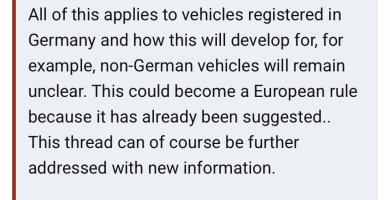Dear California owners, sometimes a question comes up about that round sticker behind on the tailgate. Many now know exactly why he is hanging, but he is now quite wise. For more information I take this information from a German Facebook page. Simply translated and posted below, and again: just as information for those interested:
Important note on the gas test for mobile homes and caravans ... this is required by law from June 19, 2025.
At the beginning of 2020, the gas test requirement as part of the general inspection was initially temporarily suspended and finally completely abolished on April 1, 2022.
On June 19, 2024, the new Section 60 of the Road Traffic Licensing Regulations (StVZO) (https://www.gesetze-im-internet.de/stvzo_2012/__60.html) was announced in the Federal Law Gazette (BGBl. 2024 I No. 191 of June 19, 2024), which now contains clear specifications for the testing of LPG systems in vehicles.
The new Section 60 StVZO stipulates that owners of vehicles that require registration and license plates must have the LPG systems of their vehicles checked. This inspection requirement applies to systems with a maximum consumption of 1.5 kg/h that are not used to power vehicles. The inspections must be carried out at the following times in accordance with the technical rules of the DVGW G 607 (A) worksheet (G 607 inspection):
1. Initial inspection before commissioning: Before the LPG system is used for the first time.
2. Inspection after changes: After changes to the system that require inspection.
3. Repeat inspection every 24 months: Thereafter at regular intervals of 24 months.
Although the obligation to carry out regular gas inspections was introduced on June 19, 2024 in accordance with Section 60 of the Road Traffic Licensing Regulations, this standard is only to be applied from June 19, 2025, with a transition period of one year, according to Section 72 Paragraph 15 of the Road Traffic Licensing Regulations.
Anyone who does not comply with the new inspection requirements will be committing an administrative offence from June 19, 2025 in accordance with Section 69a of the Road Traffic Licensing Regulations. This includes both intentional and negligent violations of the gas inspection regulations. Failure to comply can result in sanctions under the Road Traffic Act, with fines varying depending on the deadline:
* 15 euros if the deadline is exceeded by more than 2 to 4 months
* 25 euros if the deadline is exceeded by more than 4 to 8 months
* 60 euros if the deadline is exceeded by more than 8 months
Insurance-related problems are to be expected, in particular, as a defective gas system can lead to the loss of insurance cover. If, for example, it cannot be proven that the vehicle has passed the inspection in the event of an accident, this can be considered gross negligence and insurance cover will be void.
In addition, as a precautionary measure, many campsites at home and abroad require the presentation of the gas inspection certificate when checking in.
During the gas test, a recognized expert checks the entire gas system to ensure it is functioning properly. You can find this information on the DVFG e.V. website www.gaspruefung-wohnwagen-wohnmobile.de or you can ask your trusted workshop.
All of this applies to vehicles registered in Germany and how this will develop for, for example, non-German vehicles will remain unclear. This could become a European rule because it has already been suggested..
This thread can of course be further addressed with new information.
Greetings
Calibusje














